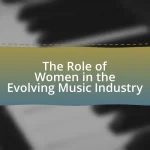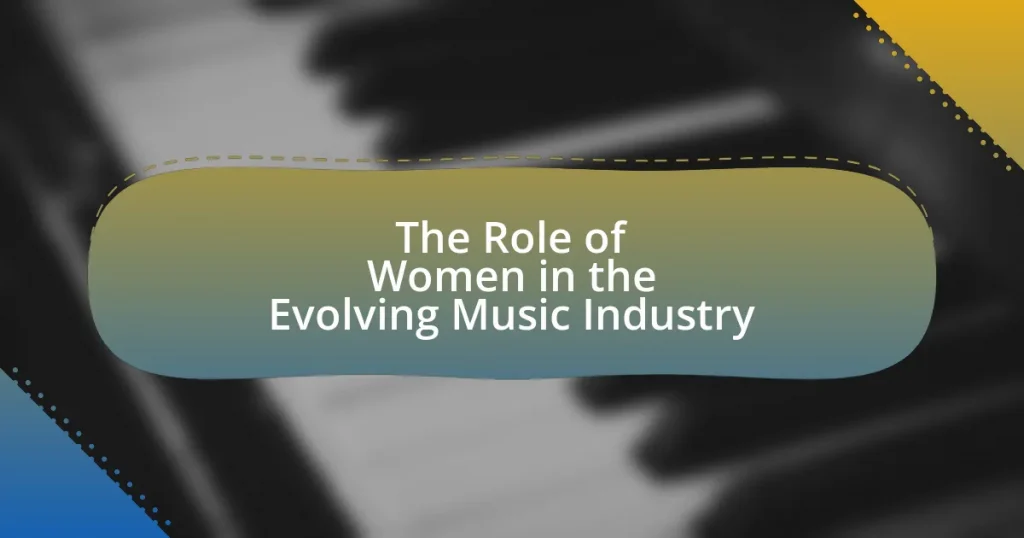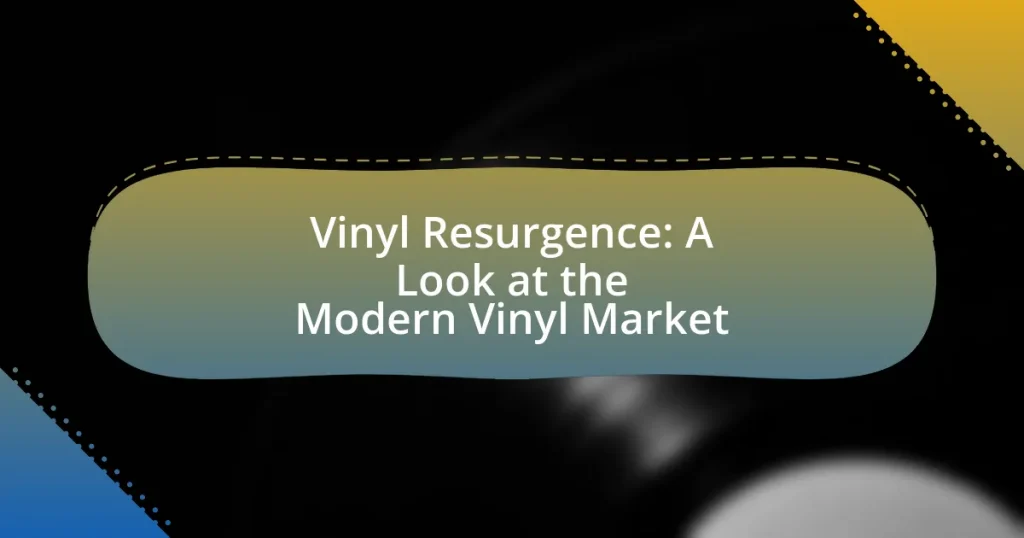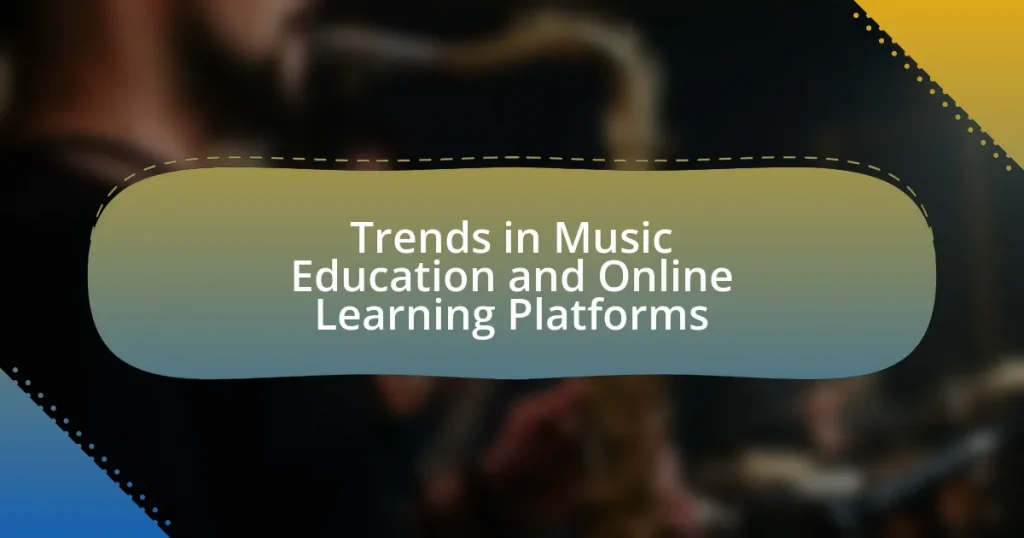The article examines the critical role of women in the evolving music industry, highlighting their contributions as songwriters, producers, and performers in a historically male-dominated field. It outlines the significant changes in women’s roles over time, marked by milestones and societal shifts that have increased their visibility and influence. The article also addresses the challenges women face today, including gender discrimination and underrepresentation in leadership positions, while discussing strategies for success, such as networking and mentorship. Furthermore, it explores the impact of technology and social media on women’s music careers and emphasizes the importance of initiatives aimed at promoting gender equality within the industry.
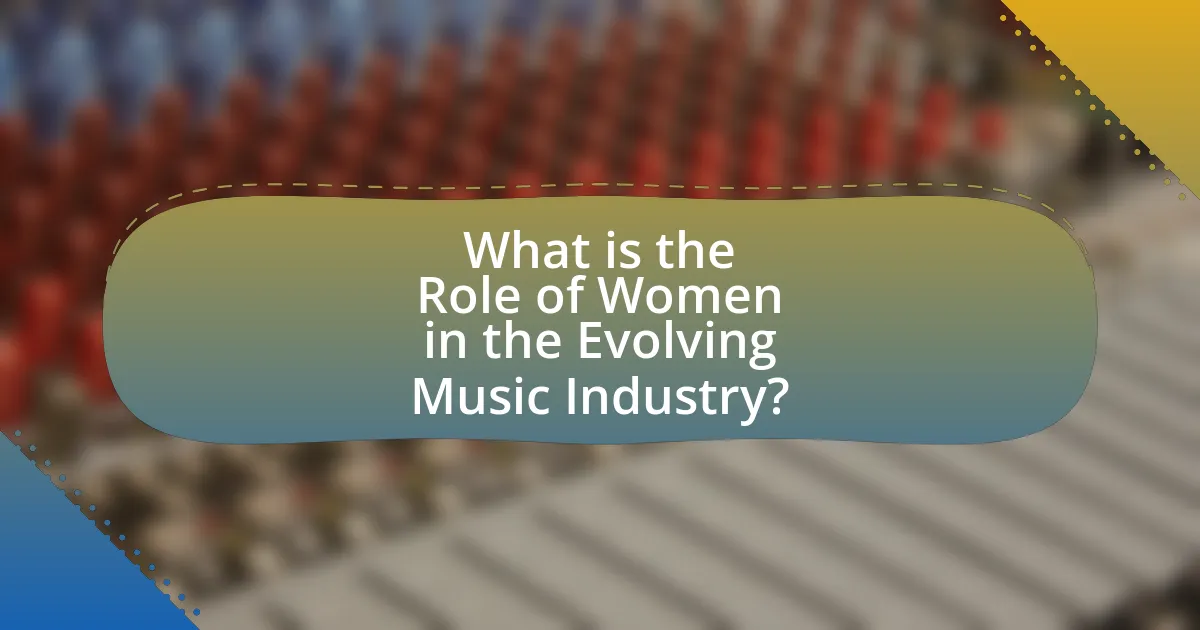
What is the Role of Women in the Evolving Music Industry?
Women play a crucial role in the evolving music industry by driving innovation, influencing trends, and advocating for diversity and inclusion. Their contributions span various aspects, including songwriting, production, and performance, which have historically been male-dominated. For instance, in 2021, women accounted for 27.7% of songwriters and 21.6% of producers in the Billboard Hot 100, highlighting their growing presence and impact. Additionally, initiatives like the Women in Music organization aim to support and empower women in the industry, further solidifying their role in shaping the future of music.
How has the role of women in the music industry changed over time?
The role of women in the music industry has evolved significantly from being primarily performers to taking on diverse roles such as producers, songwriters, and executives. Historically, women were often relegated to the background, with limited opportunities for creative input; however, the late 20th century saw a shift as female artists like Madonna and Whitney Houston gained prominence, paving the way for future generations. By the 21st century, women such as Beyoncé and Taylor Swift not only achieved commercial success but also exerted influence over their artistic direction and business decisions, reflecting a broader acceptance of women’s contributions in all facets of the industry. This transformation is evidenced by the increasing number of women in leadership positions within major record labels and the rise of female-led music festivals, highlighting a significant cultural shift towards gender equality in music.
What historical milestones have marked women’s contributions to music?
Women’s contributions to music have been marked by several historical milestones, including the emergence of female composers in the 18th and 19th centuries, such as Fanny Mendelssohn and Clara Schumann, who gained recognition in a male-dominated field. The 20th century saw significant advancements with the rise of female jazz musicians like Billie Holiday and Ella Fitzgerald, who transformed the genre and influenced countless artists. Additionally, the feminist movements of the 1960s and 1970s led to greater visibility for women in rock and pop music, exemplified by artists like Janis Joplin and Joan Jett, who challenged societal norms. The establishment of organizations such as the Women’s Music Festival in the 1970s further highlighted women’s roles in music. These milestones collectively illustrate the evolving impact of women in the music industry, showcasing their talent and resilience throughout history.
How have societal attitudes towards women in music evolved?
Societal attitudes towards women in music have evolved from viewing them primarily as performers to recognizing them as influential creators and leaders in the industry. Historically, women faced significant barriers, often relegated to roles as singers or support musicians, while male counterparts dominated songwriting and production. However, the feminist movements of the 1960s and 1970s began to challenge these norms, leading to increased visibility and opportunities for female artists.
By the 1990s and 2000s, the rise of female-led genres such as pop, rock, and hip-hop showcased women not only as artists but also as producers and executives, exemplified by figures like Missy Elliott and Sheryl Crow. Recent statistics indicate that women now comprise a growing percentage of songwriters and producers, with organizations like the Annenberg Inclusion Initiative reporting that female representation in music has increased, though disparities remain. This shift reflects a broader societal recognition of women’s contributions to music, moving towards a more equitable landscape.
What challenges do women face in the music industry today?
Women in the music industry today face significant challenges, including gender discrimination, underrepresentation in leadership roles, and unequal pay. Research indicates that women make up only about 20% of the music industry’s workforce, particularly in executive positions, which limits their influence and decision-making power. Additionally, a study by the Annenberg Inclusion Initiative found that female artists receive less airplay and fewer opportunities for promotion compared to their male counterparts, further perpetuating gender inequality. These systemic barriers hinder women’s career advancement and recognition in a predominantly male-dominated industry.
What barriers exist for women in music production and management?
Barriers for women in music production and management include gender bias, lack of representation, and limited access to networking opportunities. Gender bias manifests in the form of stereotypes that question women’s technical abilities and leadership skills, often leading to fewer opportunities for women in key roles. Research by the Annenberg Inclusion Initiative found that women held only 2.1% of production credits on popular songs in 2019, highlighting the significant underrepresentation in the field. Additionally, women often face challenges in building professional networks, which are crucial for career advancement, as industry events and informal gatherings tend to be male-dominated. These factors collectively hinder women’s progress and visibility in music production and management.
How do gender stereotypes impact women’s opportunities in music?
Gender stereotypes significantly limit women’s opportunities in music by perpetuating biases that favor male artists and diminish the visibility of female talent. For instance, women are often pigeonholed into specific genres or roles, such as being seen primarily as vocalists rather than instrumentalists or producers, which restricts their creative expression and career advancement. Research from the Annenberg Inclusion Initiative reveals that only 22.4% of artists on the Billboard Hot 100 from 2012 to 2019 were women, highlighting the systemic barriers they face. Additionally, women in music frequently encounter challenges such as unequal pay and fewer opportunities for promotion, which are exacerbated by societal expectations regarding gender roles. These stereotypes not only affect individual careers but also contribute to a broader cultural narrative that undervalues women’s contributions to the music industry.
What contributions have women made to various music genres?
Women have made significant contributions to various music genres, shaping the landscape of music through innovation, performance, and composition. In rock music, artists like Joan Jett and Stevie Nicks broke barriers, influencing generations with their powerful performances and songwriting. In jazz, figures such as Billie Holiday and Ella Fitzgerald redefined vocal techniques and emotional expression, earning critical acclaim and paving the way for future artists. In hip-hop, women like Queen Latifah and Missy Elliott have not only excelled as performers but also as producers and entrepreneurs, expanding the genre’s reach and impact. Furthermore, in country music, artists like Dolly Parton and Shania Twain have achieved commercial success while addressing social issues through their lyrics. These contributions are evidenced by numerous awards, chart-topping hits, and the lasting influence these women have had on both their respective genres and the music industry as a whole.
Which women have been influential in shaping pop music?
Madonna, Whitney Houston, and Beyoncé are among the most influential women in shaping pop music. Madonna revolutionized the genre in the 1980s with her innovative music videos and bold persona, becoming a cultural icon and influencing countless artists. Whitney Houston’s powerful vocal performances and crossover appeal in the 1990s set new standards for pop ballads, while Beyoncé has redefined modern pop through her artistry, business acumen, and advocacy for social issues, impacting the music industry significantly in the 21st century. Each of these artists has left an indelible mark on pop music, shaping its evolution and inspiring future generations.
How have women impacted the development of genres like rock, jazz, and hip-hop?
Women have significantly impacted the development of rock, jazz, and hip-hop by shaping the sound, culture, and visibility of these genres. In rock, artists like Janis Joplin and Joan Jett broke gender barriers, influencing the music’s rebellious spirit and paving the way for future female rock musicians. In jazz, figures such as Billie Holiday and Ella Fitzgerald not only showcased vocal prowess but also contributed to the genre’s evolution through innovative styles and techniques, influencing countless musicians. In hip-hop, women like Queen Latifah and Missy Elliott have been pivotal in redefining the genre, addressing social issues and empowering female voices, while also achieving commercial success and critical acclaim. Their contributions have not only enriched these genres but have also challenged societal norms, leading to greater representation and diversity within the music industry.

How do women navigate the music industry landscape?
Women navigate the music industry landscape by leveraging networking, mentorship, and advocacy for gender equality. They often build connections through industry events, social media, and collaborations, which help them gain visibility and opportunities. Research indicates that women in music benefit from mentorship programs, which provide guidance and support, enhancing their career trajectories. Additionally, organizations like Women in Music advocate for equal representation and address systemic barriers, contributing to a more inclusive environment. According to a 2021 report by the Annenberg Inclusion Initiative, women accounted for only 21.6% of artists in popular music, highlighting the ongoing challenges they face and the importance of these navigation strategies.
What strategies do women use to succeed in the music industry?
Women in the music industry succeed by leveraging networking, mentorship, and self-promotion strategies. Networking allows women to build relationships with industry professionals, which can lead to collaboration opportunities and increased visibility. Mentorship provides guidance and support from experienced individuals, helping women navigate challenges and develop their careers. Self-promotion through social media and digital platforms enables women to showcase their talent and reach wider audiences. For instance, a study by the Annenberg Inclusion Initiative found that women who actively engage in networking and mentorship are more likely to achieve leadership roles in the industry.
How important is networking for women in music?
Networking is crucial for women in music as it facilitates access to opportunities, resources, and support systems that are often less accessible due to industry biases. Women in the music industry face challenges such as underrepresentation and gender bias, making networking essential for building relationships that can lead to collaborations, mentorships, and career advancement. Research indicates that women who actively engage in networking are more likely to secure positions in leadership roles and gain visibility in a male-dominated industry. For instance, a study by the Annenberg Inclusion Initiative found that women accounted for only 21.6% of artists in popular music, highlighting the need for strategic networking to enhance representation and influence.
What role does mentorship play in women’s careers in music?
Mentorship plays a crucial role in advancing women’s careers in music by providing guidance, support, and networking opportunities. Women in the music industry often face unique challenges, including gender bias and limited access to resources, making mentorship essential for navigating these obstacles. Research indicates that women with mentors are more likely to achieve career advancement, as mentorship fosters skill development and confidence. For instance, a study published in the Journal of Music Business Research found that 70% of women in music reported that mentorship significantly impacted their career progression, highlighting its importance in creating pathways for success in a traditionally male-dominated field.
How do women artists leverage social media and technology?
Women artists leverage social media and technology to enhance their visibility, engage with audiences, and promote their work. By utilizing platforms like Instagram, TikTok, and YouTube, they can share their music, connect with fans, and build a personal brand without the need for traditional gatekeepers. For instance, a study by the University of Southern California found that female musicians who actively engage on social media platforms can increase their fan base significantly, with 70% reporting that social media directly contributed to their career growth. This demonstrates that women artists effectively harness these tools to navigate and succeed in the evolving music industry.
What platforms are most effective for women musicians to promote their work?
Social media platforms such as Instagram, TikTok, and Facebook are most effective for women musicians to promote their work. These platforms allow for direct engagement with audiences, enabling musicians to showcase their talent through videos, live performances, and personal stories. For instance, TikTok has become a significant space for music discovery, with 67% of users reporting that they have discovered new artists through the app. Additionally, Instagram’s visual nature supports branding and marketing efforts, with 80% of users following at least one business account, making it a valuable tool for musicians to connect with fans and industry professionals.
How has technology changed the way women create and distribute music?
Technology has significantly transformed how women create and distribute music by providing accessible tools and platforms that empower their artistic expression and reach. Digital audio workstations (DAWs) and affordable recording equipment have enabled women to produce high-quality music from home, reducing reliance on traditional studios. Additionally, streaming services and social media platforms allow female artists to distribute their music globally without the need for major label support, exemplified by the rise of independent artists like Billie Eilish, who gained fame through platforms like SoundCloud and YouTube. This shift has led to increased visibility and opportunities for women in the music industry, as evidenced by the growing number of female artists achieving commercial success and recognition in recent years.
What is the future of women’s roles in the music industry?
The future of women’s roles in the music industry is poised for significant growth and influence. As of 2023, women are increasingly taking on leadership positions, with a notable rise in female artists, producers, and executives. According to a report by the Annenberg Inclusion Initiative, women comprised 22.5% of artists in the top charts in 2022, a figure that has been steadily increasing, indicating a shift towards greater representation. Additionally, initiatives aimed at promoting gender equality, such as the #MeToo movement and various industry programs, are fostering an environment that supports women’s contributions and addresses systemic barriers. This trend suggests that women’s roles will continue to expand, leading to a more diverse and equitable music landscape.
How can the music industry become more inclusive for women?
The music industry can become more inclusive for women by implementing equitable hiring practices and promoting female representation in leadership roles. Research indicates that women hold only 21% of executive positions in the music industry, highlighting a significant gender disparity. By establishing mentorship programs and initiatives that support women’s career advancement, the industry can create a more balanced environment. Additionally, increasing visibility for female artists through festival lineups and media coverage can help challenge stereotypes and encourage broader acceptance. Studies show that diverse teams lead to better decision-making and innovation, further supporting the need for inclusivity in the music sector.
What initiatives are being taken to support women in music?
Various initiatives are being implemented to support women in music, including mentorship programs, funding opportunities, and advocacy for gender equality. Organizations like Women in Music provide resources and networking opportunities to empower female artists and industry professionals. Additionally, initiatives such as the She Is The Music project aim to increase the representation of women in songwriting and production roles, addressing the gender gap in the music industry. Research indicates that women are underrepresented in music production, with only 2% of producers being female, highlighting the need for these initiatives to foster inclusivity and support.
How can audiences contribute to a more equitable music industry?
Audiences can contribute to a more equitable music industry by actively supporting diverse artists and advocating for gender equality in music. By purchasing music, attending concerts, and sharing the work of female and underrepresented artists, audiences help to elevate their visibility and financial success. Research indicates that increased support for diverse artists leads to greater representation in the industry, as seen in the 2020 report by the Annenberg Inclusion Initiative, which found that only 22.4% of artists on the Billboard Hot 100 were women. This data underscores the importance of audience engagement in fostering a more inclusive music landscape.
What practical steps can women take to advance their careers in music?
Women can advance their careers in music by actively seeking mentorship, networking, and developing their skills. Engaging with mentors provides guidance and industry insights, while networking opens doors to collaborations and opportunities. Additionally, honing musical and technical skills through education and practice enhances their marketability. According to a 2021 report by the Annenberg Inclusion Initiative, women represent only 21.6% of artists in popular music, highlighting the need for increased representation and support. By taking these practical steps, women can navigate the challenges of the music industry more effectively.
What resources are available for women pursuing careers in music?
Women pursuing careers in music can access various resources, including mentorship programs, scholarships, and networking organizations. For instance, organizations like Women in Music provide networking opportunities and educational resources tailored for women in the industry. Additionally, the Berklee College of Music offers scholarships specifically for female students, promoting gender diversity in music education. Research indicates that women are underrepresented in the music industry, making these resources crucial for fostering their careers and ensuring equitable opportunities.
How can women build a supportive community within the music industry?
Women can build a supportive community within the music industry by actively networking, collaborating on projects, and creating mentorship programs. Networking allows women to connect with each other, share resources, and foster relationships that can lead to collaborative opportunities. Collaboration on music projects not only enhances creativity but also strengthens bonds among women in the industry, creating a sense of solidarity. Establishing mentorship programs enables experienced women to guide newcomers, providing valuable insights and support, which has been shown to improve retention rates of women in the industry. According to a report by the Annenberg Inclusion Initiative, mentorship significantly impacts career advancement, highlighting the importance of these supportive structures.




